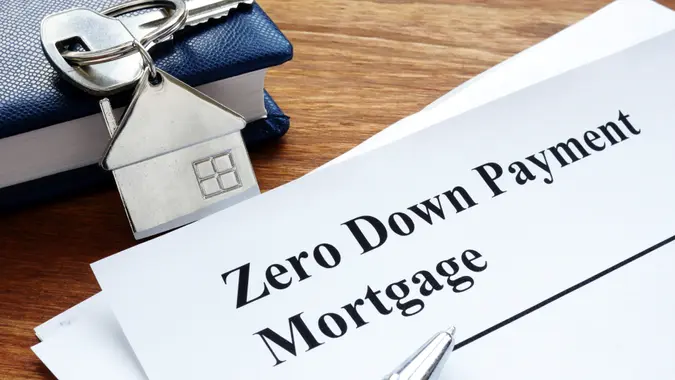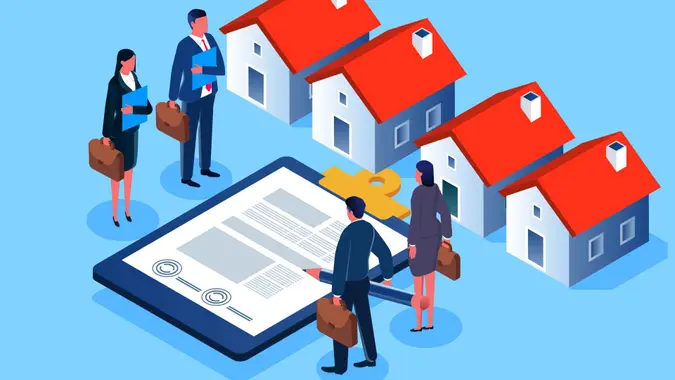Struggling To Afford Your Home? 9 Things You Should Do Next To Find Relief

Commitment to Our Readers
GOBankingRates' editorial team is committed to bringing you unbiased reviews and information. We use data-driven methodologies to evaluate financial products and services - our reviews and ratings are not influenced by advertisers. You can read more about our editorial guidelines and our products and services review methodology.

20 Years
Helping You Live Richer

Reviewed
by Experts

Trusted by
Millions of Readers
Homeowners experiencing a loss of income or financial difficulties may have trouble paying their mortgage. Luckily, there are several options to help.
If you can’t pay your mortgage or are worried about missing a payment, here are steps you can take.
Call Your Mortgage Servicer
The Consumer Financial Protection Bureau recommends calling your mortgage servicer right away if you can’t afford your mortgage. You can find the phone number on your monthly mortgage statement or in the loan coupon book your lender gave you.
Many mortgage services have programs to help people avoid foreclosure. When you call, the CFPB says to be prepared to explain:
- Why are you unable to make a mortgage payment.
- Whether the problem is temporary or permanent.
- Details about your income, expenses and assets.
Call a HUD-Approved Housing Counseling Agency
Next, the CFPB recommends calling a HUD-approved housing counseling agency through the Department of Housing and Urban Development.
A counselor can discuss your situation and determine whether you qualify for any programs or additional help. They can also guide you through the process of working with your servicers and provide help with budgeting, credit card debt or other financial problems.
Forbearance
If you can’t pay your mortgage due to temporary hardship, such as loss of income, you can ask your mortgage servicer for a mortgage forbearance. This reduces or suspends your mortgage payments for as long as 12 months until you can resume your payments.
Refinance
Another option is a mortgage refinance. If you have good credit, you can take out a new mortgage with a lower monthly payment to make your payments more affordable. According to Experian, refinancing typically works best if you have at least 20% equity in your home and you can get a new loan at a lower interest rate. This process can take weeks or months, and there are typically fees associated with the loan.
Mortgage Modification
Your mortgage servicer can permanently adjust the terms of your loan to help make your payments manageable. Experian noted that this may extend the length of your loan by several months, which means you’ll likely pay more in interest over the life of the loan.
Sell Your Home
You could sell your home if it’s worth more than what you owe. According to an ICE Mortgage Monitor report, the average homeowner currently has about $299,000 in home equity, CBS MoneyWatch reported. Keep in mind that you’re still responsible for making timely mortgage payments until closing.
Rent Out Your Home
You can rent out an extra bedroom to a friend or family member for rental income. However, Experian said that you’ll typically pay increased property insurance costs as a landlord, and you’ll still be financially responsible for home maintenance and repairs.
Short Sale
In a short sale, the mortgage servicer agrees to let you sell your home and to accept the sale amount in exchange for settling your loan. This is an option even if the sale amount is less than what you owe. According to Experian, a short sale may appear as a negative entry on your credit report and may lower your credit score.
Deed in Lieu of Foreclosure
Using a deed in lieu of foreclosure, you may vacate your home and turn the keys over to the mortgage servicer in exchange for the servicer releasing you from all mortgage obligations, Experian said. This option also has negative consequences for your credit report, but it’s not as bad as those of foreclosure.
More From GOBankingRates
 Written by
Written by  Edited by
Edited by 

























